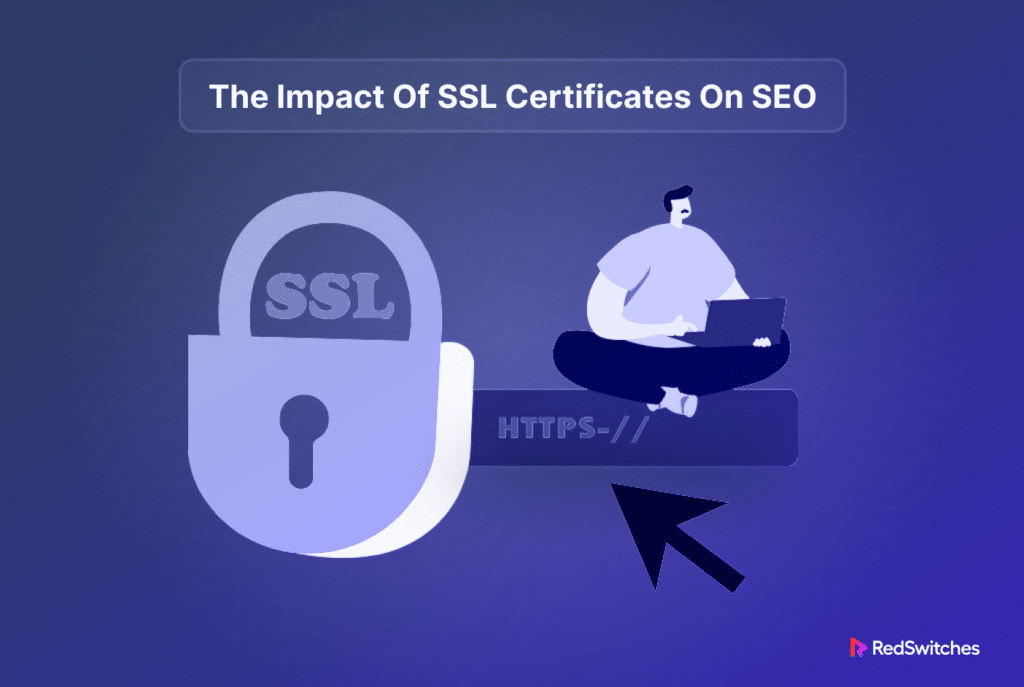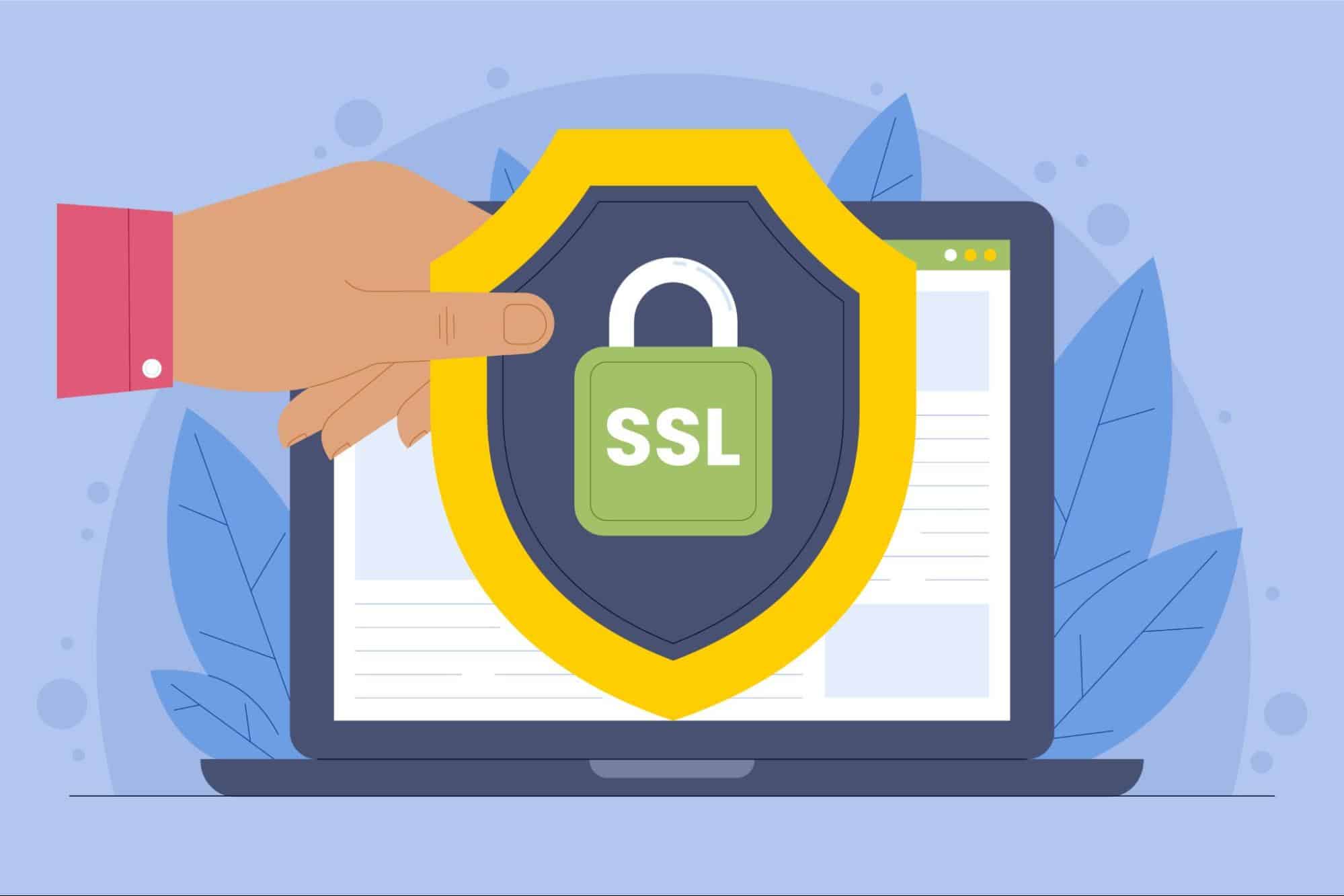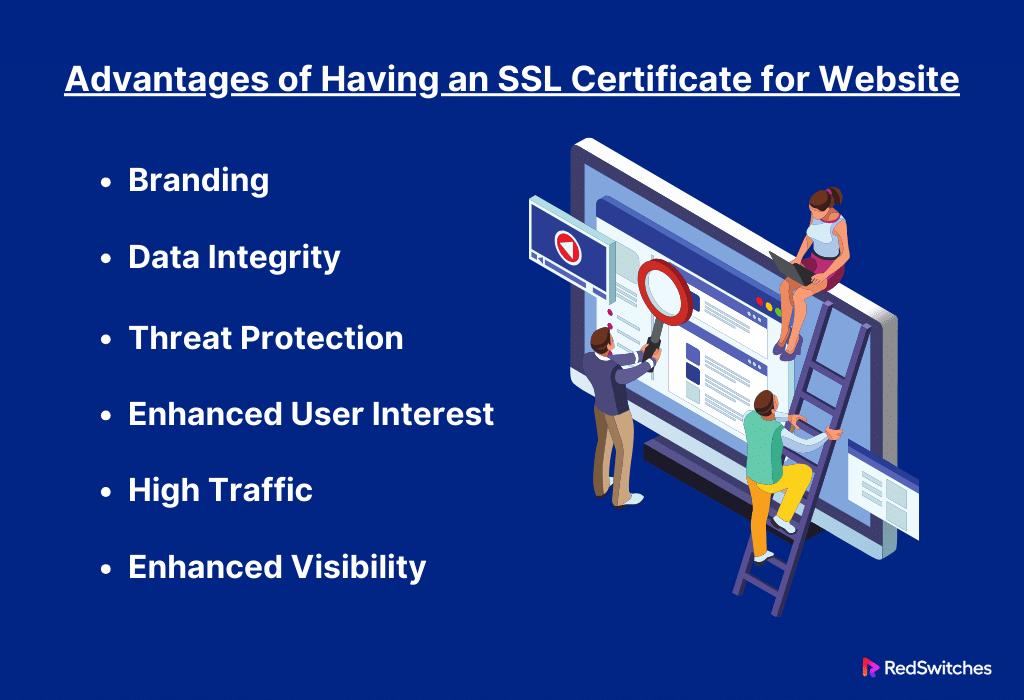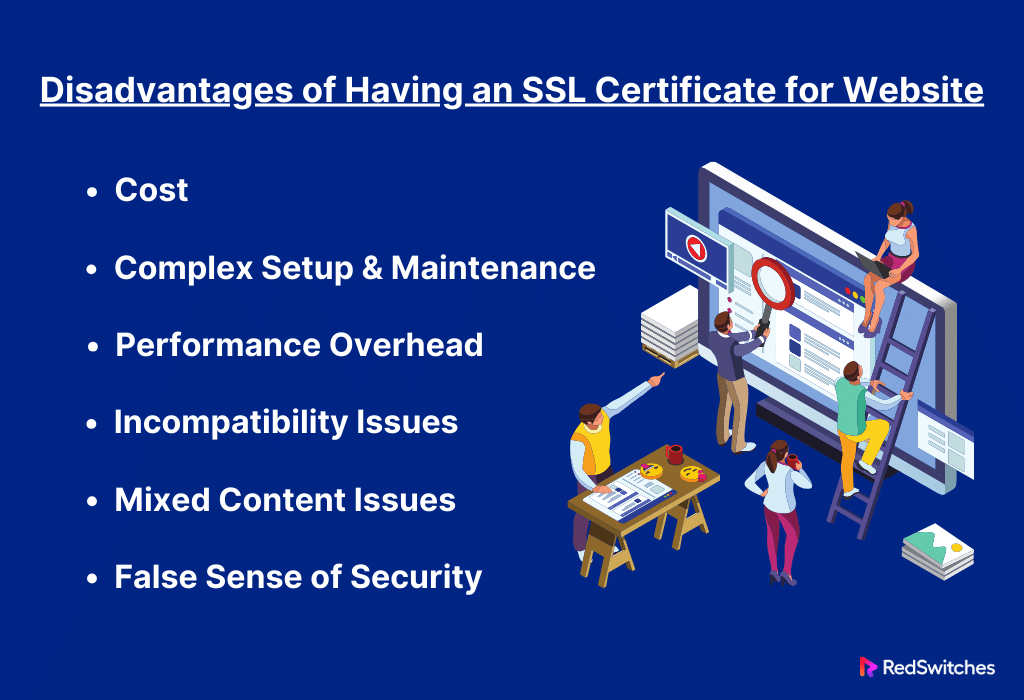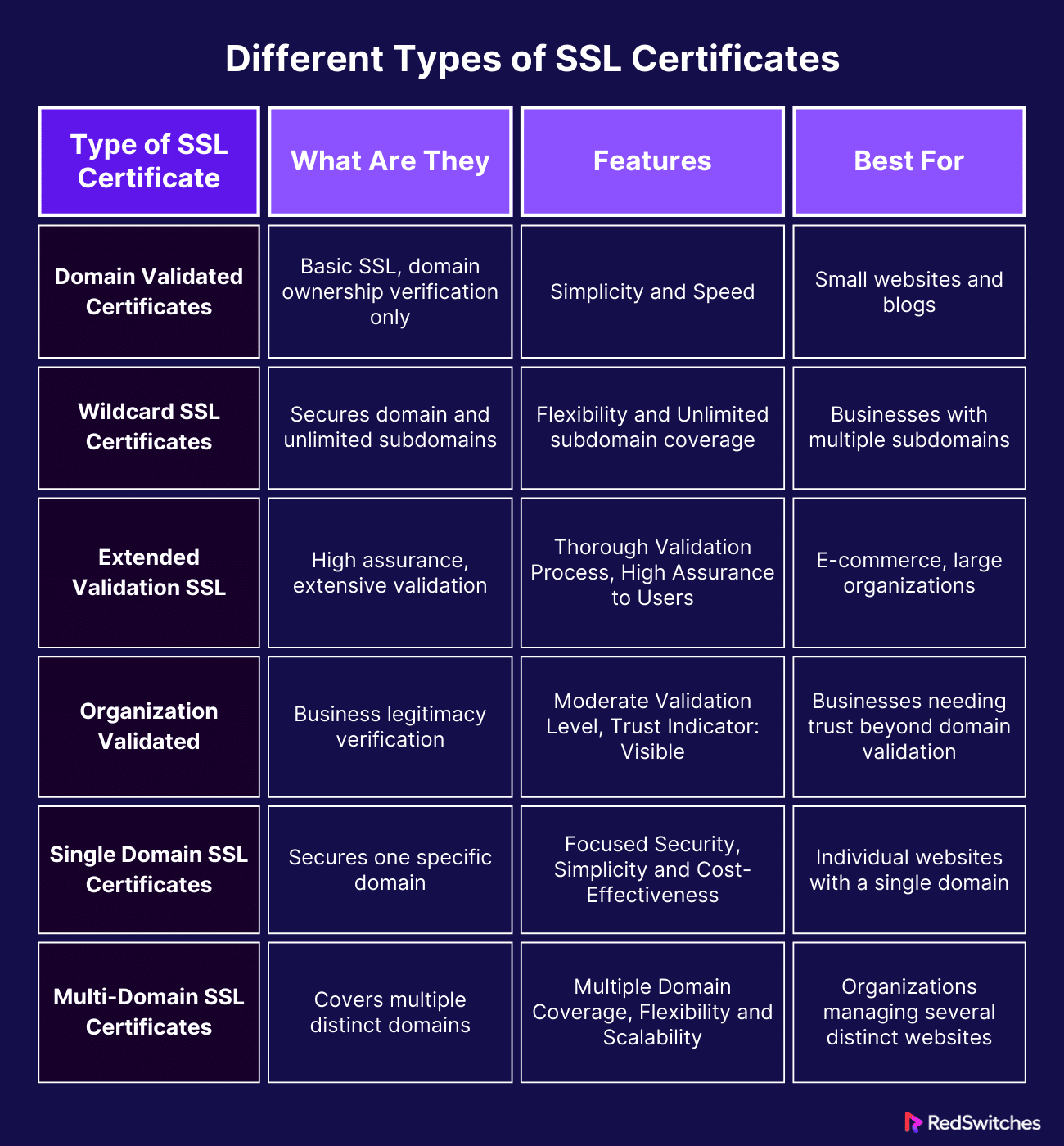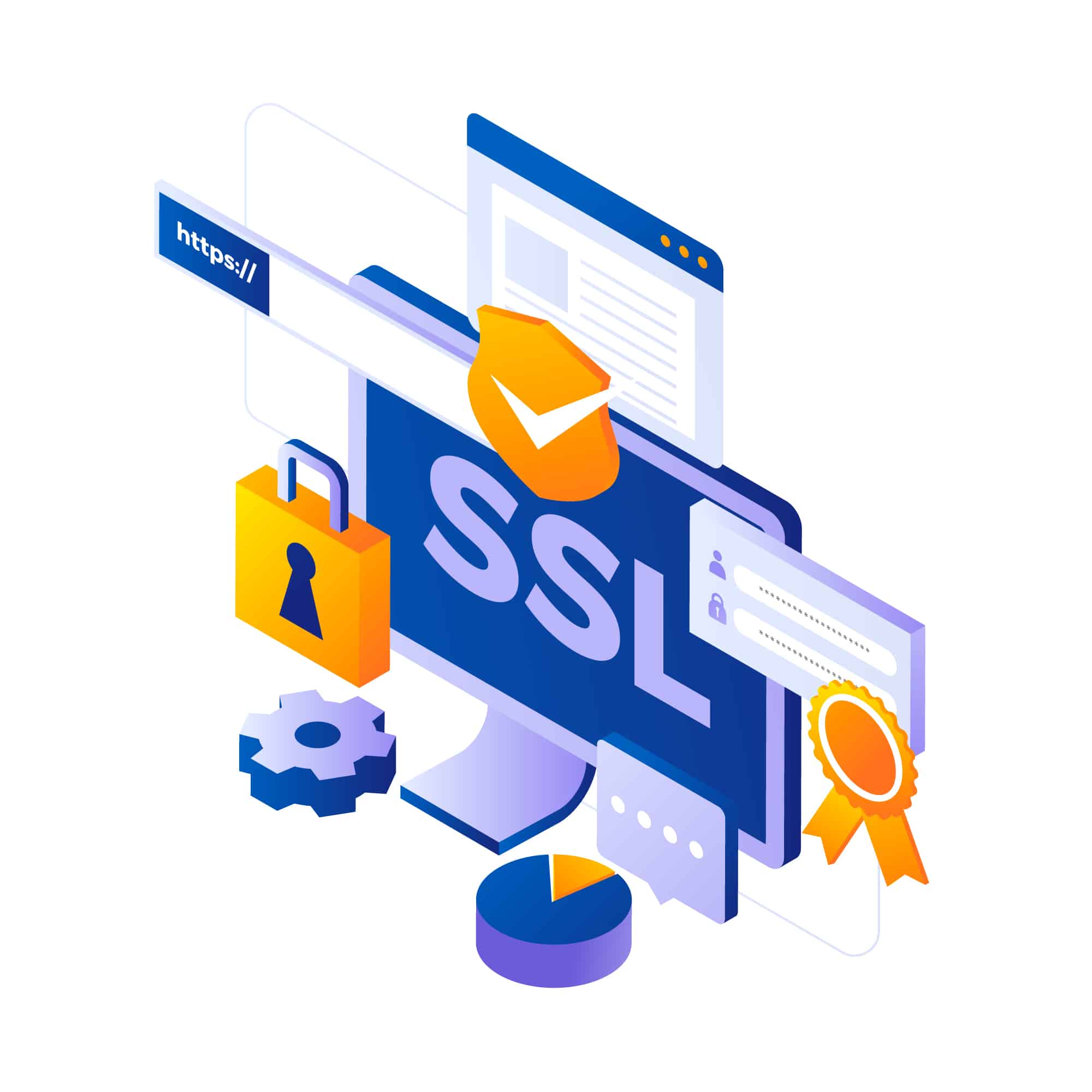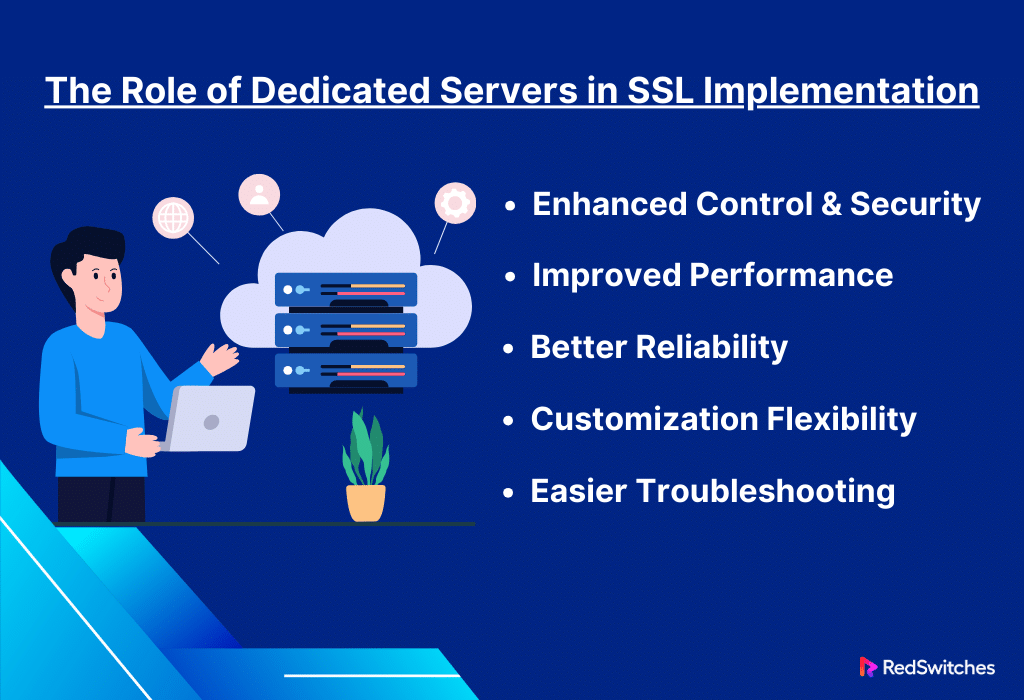Key Takeaways
- SSL certificates enhance website trustworthiness.
- SSL’s impact on user trust directly influences SEO.
- Visible SSL indicators like the padlock icon increase user confidence.
- Secure websites are favored by search engines, boosting traffic.
- There are several types of SSL certificates, including Domain Validated Certificates, Wildcard SSL Certificates, Extended Validation SSL Certificates, etc.
- HTTPS is safer than HTTP because it encrypts data transferred between a user’s browser and a website.
- Dedicated servers provide enhanced control, security, and performance for efficient SSL certificate implementation and management.
Did you know that around 2,403,857 websites in 2023 were using SSL certificates? SSL certificates are known for helping websites maintain credibility and trustworthiness. However, most people overlook the importance of an SSL certificate on SEO.
Most visitors leave a website if they see a ‘Not Secure’ warning. This shows the crucial impact of SSL certificates on user trust and, by extension, on search engine optimization (SEO).
SSL certificates, which enable HTTPS on websites, encrypt data and serve as a trust signal to both users and search engines. This blog will highlight how SSL certificate and SEO (Search Engine Optimization) rankings are connected. It will also explain why they are essential to a robust online presence.
Table of Contents
- Key Takeaways
- What is an SSL Certificate?
- Advantages of Having an SSL Certificate for Website
- Disadvantages of Having an SSL Certificate for a Website
- The Impact: SSL Certificates and SEO
- What are the Different Types of SSL Certificates?
- Which SSL Should I Buy to Improve SEO Rankings?
- Why HTTPS Is More Secure Than HTTP
- The Role of Dedicated Servers in SSL Implementation
- Conclusion – SSL certificate and SEO
- FAQs
What is an SSL Certificate?
Credits: FreePik
Before we discuss the relationship between SSL certificate and SEO, it is important to understand what an SSL certificate is.
An SSL (Secure Socket Layer) certificate is like a digital passport for a website. It’s a small data file that adds a security layer to a website. Visiting a website with an SSL certificate creates a safe link between your website’s server and the web browser. This is important because any information you enter on that website, like your name, address, or credit card number, is kept private and safe.
The SSL is the ‘Secure Sockets Layer,’ the technology to create this secure connection. When a website has an SSL certificate, you’ll usually see a padlock icon next to the website’s address in your browser, and the website’s address will begin with “https://” rather than “http://.”
This tells you that the website is safe and you can enter your personal information without worrying about hackers easily stealing it. Websites use SSL certificates to show their visitors they are trustworthy and care about keeping their data safe.
Amp up your website security with these 5 Website Security Best Practices For Businesses.
Advantages of Having an SSL Certificate for Website
Below are a few advantages of having an SSL certificate for your website:
Branding
Here are some of the advantages of having an SSL certificate for your website, particularly in terms of branding:
Building Trust and Credibility
An SSL certificate is a powerful trust indicator. When visitors pinpoint the padlock icon and ‘https’ in the address bar, it highlights that the website is secure. This helps enhance legitimacy and is especially crucial in an online world teeming with digital scams.
Displaying an SSL certificate boosts your brand’s reputation. It shows customers that their security is a priority. It’s a commitment that resonates with the audience, creating trust and credibility.
Establishing a Professional Image
A website with an SSL certificate is often considered more professional and committed. This perception is important since it helps create a strong, positive brand image.
It takes visitors as low as 50 milliseconds to determine if they wish to stay on a website. An SSL certificate sets a professional tone, distinguishing your site from less secure competitors and convincing visitors to stay on your site. This professional image can be a decisive factor for potential customers choosing between your site and others.
Data Integrity
It ensures that the information shared between the user and the website is kept private and unaltered. This is especially critical for firms managing sensitive customer data and e-commerce websites. SSL certificates preserve the integrity of the information flow by guarding against data manipulation. This is crucial for preserving user confidence and legal compliance.
Threat Protection
SSL certificates provide a fundamental layer of defense against cyber threats like phishing attacks, data breaches, and other cyberattacks. The encryption it provides makes it significantly more difficult for hackers to hack and misuse data, thereby safeguarding your website and your users’ information.
Enhanced User Interest
Websites equipped with SSL certificates typically experience increased user engagement. Knowing that a site is secure, users are more likely to spend time browsing, signing up for services, or making purchases. This increased confidence can generate higher sales and stronger customer relationships.
High Traffic
Here are some of the benefits in terms of handling high traffic:
SEO Benefits
Search engines, like Google, favor secure websites. An SSL certificate is acknowledged as a ranking factor. It can help boost a website’s search engine visibility and potentially increase organic traffic. Keep reading to learn more about the link between SSL certificate and SEO.
Lower Bounce Rates
Secure websites are less likely to experience high bounce rates. When users feel secure, they are more inclined to stay and engage with the content. This leads to longer visit durations and more interactions. Reducing bounce rates can directly affect a website’s ability to generate leads. Visitors staying on your website are more likely to buy your offerings.
Enhanced Visibility
Here’s how SSL certificates can improve visibility:
Improved Search Engine Ranking
Every website aims to rank on Google’s first page. According to statistics, around 46% of product searches start on Google. 0.63% of buyers click on Google’s second-page search results. SSL certificates contribute to higher search engine rankings. This enhanced visibility in search results translates into more site visits, increased traffic, and more conversions.
Positive User Perception
Secure websites often enjoy a boost in user perception. A commitment to security helps your site stand out in a crowded digital space. It can serve as a magnet, attracting visitors and potential customers.
Disadvantages of Having an SSL Certificate for a Website
Below are a few disadvantages linked to having an SSL certificate for a website:
Cost
The most prominent disadvantage of SSL certificates is the cost. There are free SSL options available. However, they often lack the advanced features and support with paid certificates. Premium SSL certificates can be costly, especially those that offer extended validation. This cost can be a major factor for small businesses or individuals running personal blogs with limited budgets.
Complex Setup and Maintenance
Implementing an SSL certificate isn’t always straightforward, especially for those without technical expertise. The process involves:
- Generating a Certificate Signing Request (CSR).
- Installing the certificate.
- Configuring the webserver to use HTTPS.
Any misstep in this process can lead to errors or website downtime. SSL certificates also require regular maintenance, including renewals. Forgetting to renew an SSL certificate can result in your website being flagged as insecure. This can deter visitors.
Also Read: 14 WordPress Security Issues And How To Fix Them.
Performance Overhead
Although modern technology has significantly minimized this concern, encrypting and decrypting data with SSL can introduce some performance overhead. This is more noticeable on websites with high traffic or limited server resources. The SSL handshake process occurs every time a user connects to an HTTPS website and can also contribute to slight delays, impacting the site’s overall speed and user experience.
Incompatibility Issues
Some older browsers or operating systems might not support newer SSL protocols. Websites with SSL certificates might face compatibility issues with these outdated systems, potentially limiting accessibility for a fraction of the audience. This is particularly relevant for websites with a user base that may use older technology.
Mixed Content Issues
When a website migrates from HTTP to HTTPS, all its resources must be served over HTTPS. This is done to avoid mixed content warnings. These warnings occur when an HTTPS site contains elements served over an unencrypted HTTP connection. Resolving mixed content issues can be time-consuming, especially for websites with numerous pages and resources.
False Sense of Security
Depending only on SSL for website security can create a false sense of security among website owners. Although SSL encrypts data in transit, it doesn’t protect against other vulnerabilities like hacking attempts. A comprehensive security strategy is necessary for complete protection.
Here’s an overview of all the pros and cons of SSL certificates:
The Impact: SSL Certificates and SEO
The relationship between SSL certificate and SEO has become a focal point for businesses and webmasters today. Understanding this relationship can help businesses move and webmasters accelerate their path to success. Below, we shed light on the relationship between SSL certificate and SEO.
Google’s Preference for HTTPS
Credits: FreePik
One of the most significant impacts of an SSL certificate on SEO is its direct influence on search engine rankings. Google announced that HTTPS would be a ranking signal in 2014. This move was part of a broader initiative to ensure a safer internet. Since HTTPS encrypts data transferred between a user and a website, it helps prevent interception or tampering. Google knew the safer the internet would become the more websites adopted HTTPS.
Over the years, Google has continued to emphasize the importance of HTTPS. The search engine has subtly increased its influence as a ranking factor. Websites that adopt HTTPS benefit from a secure environment and enjoy a better ranking in search results. This focus on HTTPS illustrates Google’s commitment to user security as a critical aspect of website quality.
Also Read: 12 Ways of Fixing ERR_SSL_VERSION_OR_CIPHER_MISMATCH Error
Increased Crawlability
The role of SSL certificates in enhancing website crawlability is often overlooked. Search engine bots, which are responsible for indexing web pages, show a preference for secure websites. These bots are developed to mimic user behavior, and prioritizing secure sites aligns with the growing preference for HTTPS.
An SSL certificate fosters trust and authenticity, signaling to these bots that a website is a credible source of information. Better crawlability means a better chance of being indexed accurately and a better opportunity for higher search rankings.
Boosting User Trust and Engagement
Trust is critical from a user’s perspective. An SSL certificate provides visible cues to a website’s security. It mainly achieves this through the padlock icon in the address bar. This visible assurance of security can profoundly affect user behavior. Websites with SSL certificates see lower bounce rates as users feel more secure spending time on the site.
These websites also often experience higher user engagement. This is because users are likelier to interact with and return to a site they trust. Search engines use sophisticated algorithms to measure user experience. They factor these elements into their ranking decisions, often favoring websites that offer a secure and engaging user experience.
Also Read: How To Choose A Web Hosting Provider – Expert’s Guide.
Site Speed and Performance
Another less direct but equally important aspect of an SSL certificate and SEO is related to website performance. It’s well-established that faster-loading websites provide a better user experience and are more likely to be preferred by search engines. HTTPS can improve load times by using HTTP/2. This is a major revision of the HTTP network protocol.
HTTP/2 has features like multiplexing and header compression. This allows for accelerated data transfer and reduced latency. Websites can enjoy a competitive edge in user experience and search engine rankings by switching to HTTPS and enabling HTTP/2.
What are the Different Types of SSL Certificates?
When deciding on an SSL certificate for SEO, it is important to review the different SSL certificate types and choose the best one for your needs and requirements. Below are a few different types of SSL certificates:
Domain Validated Certificates
Domain Validated Certificates are the most basic form of SSL certificate. Here is more information about them:
- Simplicity and Speed: Getting a DV certificate is quick. It usually involves the certificate authority emailing the domain’s registered email address. Once you respond to that email, your certificate is issued.
- Level of Security: DV certificates encrypt the user data, making it safe from eavesdropping. They don’t validate the identity of the person or organization behind the website.
- Best For: Small websites or blogs that don’t handle sensitive user data. A DV certificate is usually satisfactory for running a personal blog or a small portfolio site.
Wildcard SSL Certificates
Wildcard SSL certificates are like the handy multi-tools of SSL certificates. Here is more information about them:
- Flexibility: You can secure any subdomains with a Wildcard SSL certificate. For instance, if you have a domain like example.com, a Wildcard SSL certificate can secure blog.example.com, shop.example.com, and other subdomains.
- Cost-Effective: You can use one Wildcard SSL certificate instead of buying separate SSL certificates for each subdomain. This can be cost-effective if you have multiple subdomains.
- Best For: Wildcard SSL Certificates are best for organizations managing multiple subdomains under a single domain, seeking a cost-effective and efficient solution to secure all their subdomains.
Extended Validation SSL Certificate
Extended Validation SSL Certificates are the top-tier SSL certificates. They offer the highest level of security and are easily identifiable:
- Thorough Validation Process: The website owner must undergo an extensive validation process to get an EV SSL certificate. This process includes verifying the entity’s legal, physical, and operational existence. It’s thorough and can take time.
- High Assurance to Users: EV SSL certificates provide a visual indicator in the browser’s address bar, usually a green bar with the company’s name. This makes it easy for visitors to trust the website.
- Best For: Given their high level of validation and trust, EV SSL certificates are ideal for large businesses, especially e-commerce websites that manage sensitive customer data like credit card details.
Organization Validated Certificates
Organization Validated Certificates offer a middle ground in the SSL certificates space. Here is more information about them:
- Validation Level: The role of OV certificates goes beyond just validating the ownership of the domain. They also verify the existence of the organization behind the domain. This process includes checking the company’s details, such as its name, location, and existence as a legal entity.
- Trust Indicator: Websites with OV certificates display a padlock in the browser’s address bar alongside the organization’s details when clicked. This boosts user trust by showing that a legitimate entity is behind the website.
- Best For: OV certificates are suitable for businesses and organizations that want to establish a higher level of trust with users than what a basic Domain Validated certificate offers but do not need the extensive validation of an EVC.
Single Domain SSL Certificates
Single Domain SSL Certificates are created for securing one specific domain or subdomain. Here is more information about them:
- Focused Security: These certificates are best for businesses that need to secure a single domain or subdomain. Whether it’s your primary domain or a specific subdomain, these certificates have you covered.
- Simplicity and Cost-Effectiveness: For small businesses or individual websites that don’t need to secure numerous domains or subdomains, Single Domain SSL Certificates offer a straightforward and budget-friendly solution.
- Best For: Single Domain SSL Certificates are best for businesses or individuals with a single website or domain requiring secure, encrypted communications.
Multi-Domain SSL Certificates
Multi-domain SSL Certificates, often referred to as Unified Communications Certificates, are versatile and efficient. Here is more information about them:
- Multiple Domain Coverage: These certificates allow you to secure multiple domain names with a single SSL certificate. For instance, you can protect example.com and example.net, all under one certificate.
- Flexibility and Scalability: They are ideal for businesses that own multiple domain names or manage several websites. Instead of purchasing and managing separate SSL certificates for each domain, you can streamline your management process with a single Multi-Domain SSL Certificate.
- Best For: Multi-Domain SSL Certificates are ideal for organizations managing multiple websites or diverse domains and subdomains across different brands or service types, requiring a unified security solution.
Do you want to learn more in detail about the six types of SSL certificates? Read our comprehensive blog, ‘6 Types Of SSL Certificates For Your Website.’
Which SSL Should I Buy to Improve SEO Rankings?
When you’re thinking about improving your website’s SEO rankings, one important step is getting an SSL certificate and SEO improvement often go hand in hand. With so many SSL certificates, which one should you buy?
Credits: FreePik
Firstly, understand that any SSL certificate is better than none regarding SSL certificate and SEO benefits. Search engines always prefer secure websites. This means websites with HTTPS (indicated by an SSL certificate) have a increased chance of ranking higher. That being said, not all SSL certificates are the same. Consider the points below for informed decision-making:
- Go for a Trusted Provider: Choose an SSL certificate from a well-known and trusted Certificate Authority. This ensures your SSL is recognized and trusted by browsers and search engines, which is important for SSL certificate and SEO.
- Consider Domain Coverage: If you have multiple domains or subdomains, look for SSL certificates that cover them all. A single, comprehensive SSL can simplify the process and benefit SSL certificate and SEO.
- Level of Validation: There are different levels of validation – Domain Validated, Organization Validated, and Extended Validation. EV or OV certificates are preferable for the best SSL certificate and SEO impact, as they offer a higher level of validation. This can help can boost customer trust and, in turn, SEO rankings.
- Ensure Proper Installation: Just buying an SSL certificate isn’t enough. Make sure it’s properly installed and configured. Incorrect installation can hurt your SSL certificate and SEO efforts.
- Regularly Update and Maintain: Keep your SSL certificate updated. An expired SSL can harm your website’s credibility and negatively impact your SSL certificate and SEO rankings.
Any SSL certificate can help with your SEO, but for the best SSL certificate and SEO results, choose a trusted provider, consider the extent of coverage needed, opt for higher validation levels, ensure proper installation, and maintain it regularly. This approach can boost your website’s SEO rankings.
Why HTTPS Is More Secure Than HTTP
HTTPS is known as the more secure version of HTTP. It plays an important role in ensuring the integrity and safety of information transmitted over the internet. Let’s further discuss why HTTPS is more secure than HTTP.
The Fundamental Difference
The main difference between HTTP and HTTPS is in the ‘S’ at the end of HTTPS. This ‘S’ stands for ‘Secure.’ This seemingly minor addition represents the implementation of an SSL certificate. This encryption is crucial in protecting the data from being intercepted or tampered with by malicious actors.
How HTTPS Enhances Security
HTTPS (Hypertext Transfer Protocol Secure) enhances security in several key ways:
-
Encryption
When a website uses HTTPS, the data transferred between the user’s browser and the server is encrypted. This encryption ensures that sensitive information like login details, personal information, and credit card numbers are not readable by anyone who might intercept the data.
-
Data Integrity
HTTPS also ensures data integrity, meaning the data cannot be corrupted or altered during transfer without detection. This prevents tampering and ensures that the information a user sends or receives is exactly what was intended.
-
Authentication
Another critical aspect of HTTPS is authentication. It verifies that users are communicating with the intended website, not a fraudulent one. This is especially important for preventing ‘man-in-the-middle‘ attacks. This refers to when attackers try impersonating a website to steal data.
Additional Benefits of HTTPS
Apart from enhanced security, HTTPS offers additional benefits:
Building Trust with Users
When a website is secured with HTTPS, it’s easily identifiable by the padlock icon or a green address bar in the browser’s URL field. This visual indication is a powerful tool in building user trust. It reassures visitors that any data they share with the website will be encrypted and secure.
This level of trust is especially crucial for e-commerce sites or any online platforms that handle personal or financial information. Security assurance can significantly increase user engagement and conversions. It increases the chances of visitors interacting with and purchasing from a site.
Compliance with Regulations
Complying with data protection regulations is more than a best practice. It is a legal requirement during times when data breaches and privacy concerns are common. Many privacy laws and standards mandate using HTTPS for websites collecting or processing personal data.
Non-compliance can result in hefty fines and damage to a company’s reputation. By using HTTPS, businesses can ensure they meet these regulatory requirements, avoiding legal pitfalls and reinforcing their commitment to user privacy.
Better Performance
A common misconception is that the encryption process in HTTPS may slow down website loading times. In reality, HTTPS can improve website performance. This is mainly due to the HTTP/2 protocol requiring an HTTPS connection.
HTTP/2 introduces several optimizations, like multiplexing and header compression. This can significantly speed up the loading of web pages. Many modern browsers only enable optimizations for HTTPS sites. This further enhances performance.
Also Read: Choosing The Right Dedicated Server: 7 Step Ultimate Guide.
The Role of Dedicated Servers in SSL Implementation
Dedicated servers play a crucial role in SSL implementation. Let’s discuss this in further detail:
Enhanced Control and Security
A dedicated server empowers you to hold complete control over the server environment. This control is crucial when installing an SSL certificate because it requires specific server configurations. On shared hosting, you’re limited by the shared environment and often need permission from the hosting provider to make certain changes. Dedicated servers enable for the configuration of environments to meet the exact requirements of your SSL certificate, ensuring optimal security.
Improved Performance
Performance is key for any website. SSL certificates can directly affect your site’s performance. The resources are exclusively yours on a dedicated server, meaning faster loading times and smoother performance, even when implementing SSL. This is especially important since SSL involves data encryption and decryption, which can be resource-intensive.
Better Reliability
Dedicated servers offer a more reliable environment for SSL implementation. The downtime risks are considerably reduced since you’re not sharing resources with other sites. This reliability is important for maintaining the security features that come with SSL certificates, as any downtime can lead to security vulnerabilities.
Customization Flexibility
Every website has unique needs. With a dedicated server, you can customize the server settings to fit those needs. This flexibility extends to SSL implementation, where you might need to adjust server configurations for optimal SSL performance.
Easier Troubleshooting
It’s simpler to troubleshoot and resolve issues with SSL certificates on a dedicated server. Since you control the server environment, you can quickly find and tackle any issues without going through a third-party provider.
Conclusion – SSL certificate and SEO
SSL certificate and SEO both go hand in hand. By providing encryption and security, website owners can protect sensitive user data and enhance a website’s trustworthiness in search engines and users’ eyes. This trust is critical in improving search engine rankings and driving organic traffic.
If you are a business looking to optimize your website’s SEO and security, RedSwitches offers solutions that include SSL certificates. Our services ensure your website ranks higher in search engine results and maintains the highest security standards.
With RedSwitches, you can create a secure, SEO-friendly online environment that stands out in the competitive digital space. Visit our website immediately to learn how we can elevate your website’s SEO performance using SSL certificates.
FAQs
Q. Does SSL certificate help SEO?
Yes, an SSL certificate and SEO are closely linked. Implementing an SSL certificate can positively impact your website’s search engine optimization. This is because an SSL certificate boosts security and user trust and improves your site’s ranking on SERP.
Q. What does SSL mean in SEO?
In SEO, SSL means providing a secure, encrypted connection between a web server and a browser. This security measure is a positive ranking factor in SEO. It boosts your site’s credibility and trustworthiness.
Q. Does SSL affect Google’s ranking?
An SSL certificate and SEO are essential factors in Google’s ranking algorithm. Google has confirmed that SSL is used as a ranking signal. Websites with SSL certificates may have a ranking advantage over non-secure sites.
Q. What is the impact of SSL certificates on SEO rankings?
SSL certificates can positively impact SEO rankings as search engines consider website security as a ranking signal. Websites using HTTPS protocol have a higher chance of ranking well in search engine results.
Q. Why is it important for SEO to use HTTPS and SSL certificates?
Using HTTPS and SSL certificates is important for SEO because it enhances website security and boosts SEO rankings. This makes it a crucial element for improving a website’s search engine optimization.
Q. How does SSL affect SEO rankings?
SSL affects SEO rankings by providing a secure and encrypted connection, which is considered as a positive factor by search engines when determining the rank of a website. It helps in boosting the website’s SEO performance.
Q. Do SSL certificates have a direct impact on search engine optimization?
Yes, SSL certificates directly impact search engine optimization. Websites using SSL are likely to rank higher on search engine results pages due to the positive impact of enhanced website security.
Q. How can I boost my SEO with SSL certificates?
You can boost your SEO by using SSL certificates to secure your website with HTTPS protocol. This helps improve your website’s search engine optimization and can positively impact your rankings.
Q. Do I need an SSL certificate for my website’s SEO?
SSL certificate and SEO go hand in hand. You need an SSL certificate for your website’s SEO. It is essential for securing your website. It positively impacts your SEO rankings, making it crucial for improving your website’s search engine optimization.
Q. What is the significance of SSL certificates in relation to SEO?
There is a major link between SSL certificate and SEO. SSL certificates are significant for SEO as they enhance website security. They are important for securing website data and improving search engine optimization.
Q. How important is it to secure your website with an SSL certificate for SEO?
It is critical to secure your website with an SSL certificate for SEO. Doing so boosts your website security and enhances your SEO rankings. It is essential for improving your site’s search engine optimization.
